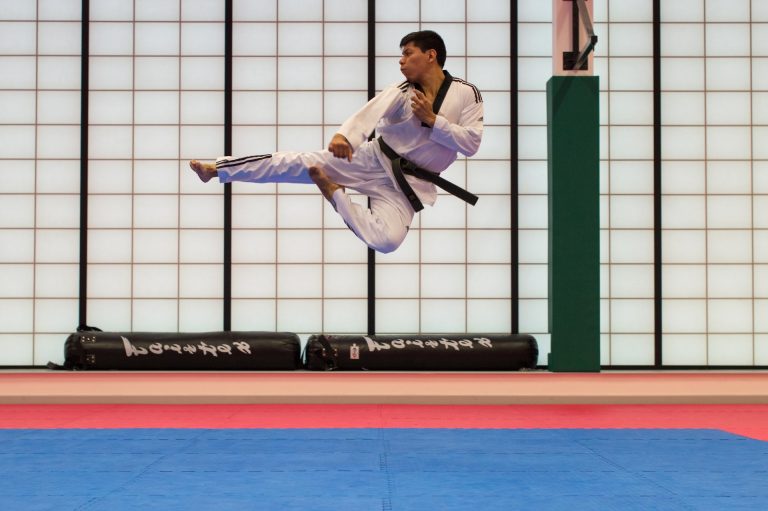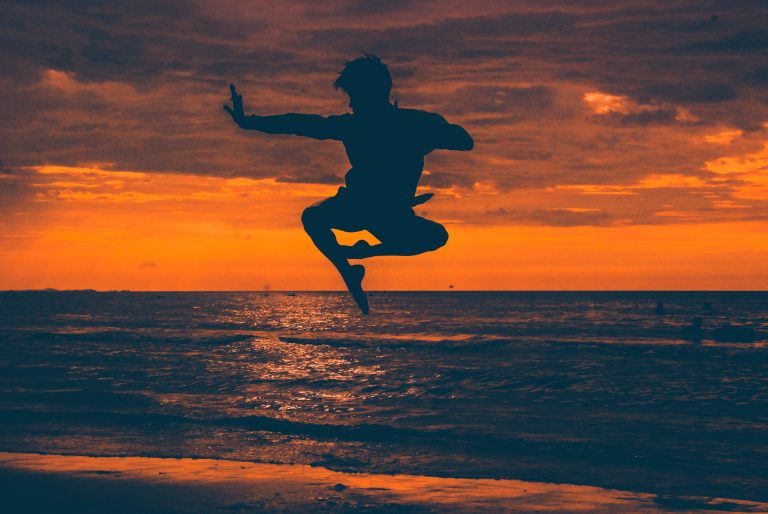Karate Wettkampfregeln
Karate ist eine beliebte Kampfsportart, die sowohl als Freizeitaktivität als auch im Wettkampf ausgeübt wird. Für alle Karateka, die an offiziellen Wettkämpfen teilnehmen möchten, ist es wichtig, die Wettkampfregeln zu kennen, um die sportliche Fairness und die eigene Sicherheit gewährleisten zu können.
Im Folgenden werden die wichtigsten Karate-Wettkampfregeln kurz erläutert:
Punktevergabe
Bei Karate-Wettkämpfen werden Punkte vergeben, wenn ein Kämpfer einen korrekten Treffer auf den Körper oder den Kopf seines Gegners erzielt. Die Anzahl der Punkte hängt von der Art des Treffers ab: Ein Schlag oder Tritt auf den Körper gibt einen Punkt, ein Schlag oder Tritt auf den Kopf gibt drei Punkte. Treffer auf den Arm oder das Bein werden nicht gewertet.
Zeitbegrenzung und Runden
Karate-Wettkämpfe sind in der Regel auf drei Runden à zwei Minuten begrenzt. In internationalen Turnieren kann es jedoch unterschiedliche Regelungen geben. Zwischen den Runden gibt es jeweils eine Pause von einer Minute.
Fairness und Sicherheit
Im Karate sind bestimmte Techniken wie beispielsweise Tritte gegen das Knie oder den Unterleib, Schläge gegen die Genitalien oder den Hals sowie Hebel und Würfe generell verboten. Der Einsatz dieser Techniken führt zur Disqualifikation oder Verwarnung durch den Schiedsrichter. Zudem ist es verboten, den Gegner absichtlich zu verletzen oder zu beleidigen.
Kampfkleidung und Schutzausrüstung
Die Kampfkleidung beim Karate besteht aus einem weißen Anzug, dem Karate-Gi, und einem farbigen Gürtel, der den Grad des Kämpfers symbolisiert. Weiterhin müssen beide Kämpfer eine Schutzausrüstung tragen, die aus einem Kopfschutz, einer Brustschutzweste, einem Tiefschutz, einer Schiene für das Schienbein und einem Mundschutz besteht.
Entscheidung des Siegers
Am Ende des Kampfes wird der Sieger anhand der Gesamtpunktzahl ermittelt. Wenn die Punktzahl unentschieden ist, wird eine Verlängerung von einer Minute ausgetragen. Falls auch hier kein Sieger ermittelt wird, entscheidet das Kampfgericht.
Mit diesen karatespezifischen Regeln sind Sie nun bestens gerüstet, um an Wettkämpfen teilzunehmen. In jedem Fall gilt, dass Sie stets fair und respektvoll gegenüber Ihrem Gegner auftreten sollten, um eine stets positive Einstellung zu fördern.
Frequently Asked Questions about Karate Wettkampfregeln
Karate is a popular martial art that requires skill, discipline, and focus. In a karate competition, following the rules is crucial to ensure the safety of all participants and to maintain the integrity of the sport. In this post, we will answer some of the most frequently asked questions about the karate wettkampfregeln or competition rules.
1. What are the weight categories in karate?
Karate competitions have both male and female categories, and participants are grouped based on their weight. The weight categories are divided as follows:
– Female: -50kg, -55kg, -61kg, -68kg, +68kg
– Male: -60kg, -67kg, -75kg, -84kg, +84kg
2. What is the duration of a karate match?
A karate match typically lasts for 3 minutes, with a 1-minute break in between rounds. If the score is tied at the end of the match, an additional round is added, called the „golden point round,“ with the first point scoring the winner.
3. What is the scoring system in karate?
In karate competitions, there are three types of points that can be scored:
– Yuko: 1 point
– Waza-ari: 2 points
– Ippon: 3 points
A yuko is awarded for a technique that lands with moderate contact, a waza-ari for a technique that lands with significant force, and an ippon for a technique that lands with full force and completely incapacitates the opponent. An ippon can also be awarded for a throw or takedown that lands the opponent on their back.
4. What are the prohibited techniques in karate?
The following techniques are strictly prohibited in karate competitions:
– Punches or strikes to the face or throat
– Strikes to the back of the head or neck
– Knee strikes
– Elbow strikes
– Throws that result in the opponent landing on their head or neck
– Chokes or strangles
– Joint locks
5. Can a fighter be disqualified for breaking the rules?
Yes, a fighter can be disqualified for breaking the rules. The referee has the authority to issue warnings, point deductions, and disqualifications for rule violations. The decision of the referee is final and cannot be challenged.
6. What is the etiquette in karate competitions?
Karate competitions are governed by strict etiquette, which includes bowing to your opponent and the referee before and after the match. You should also bow when entering and leaving the competition area. Showing respect to your opponent, the referees, and the judges is an important part of karate culture.
7. Can a fighter wear any type of uniform in a karate competition?
No, fighters are required to wear a karate uniform, also known as a gi. The gi should be clean and free from any tears or holes. The belt should be tied correctly, with the appropriate rank color based on the fighter’s experience level.
8. What are the responsibilities of the cornermen?
Cornermen are responsible for helping the fighter between rounds. They can give the fighter water and advice, but they cannot interfere with the referee’s decision or help the fighter cheat in any way.
In conclusion, understanding the karate wettkampfregeln is crucial for anyone participating in a karate competition. By knowing the weight categories, duration of the match, scoring system, prohibited techniques, and etiquette, fighters can perform to the best of their ability while maintaining the integrity of the sport.
Inhaltsverzeichnis






